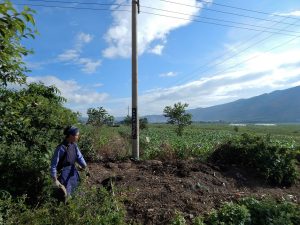Current research on China’s rural villages usually asks what migrants have contributed economically to villages and sociocultural change in rural life. We take a different tack: in the midst of changes to village economies and community life, especially since the beginning of migration out of the village in the early 1990s, we ask how the work of villagers who do not migrate – usually the elderly, mothers, and children – contributes to the sustainability of the local farming ecology and of village cultural traditions. We expect that religious traditions, in particular, have been important sources of social cohesion and identity for all villagers, stay-behinds and migrants. By cultural sustainability, we mean that as culture changes, it continues to serve the needs of the community as a source of useful values, meanings and identity across generations (adapted from Daskon and Binns 2009). A sustainable farm ecology is characterized as one that leaves sufficient local environmental resources for the support of the next generation (adapted from Kates et al 2005).
China Practicum – AsiaNetwork Freeman Student-Faculty Research Grant Dickinson College
